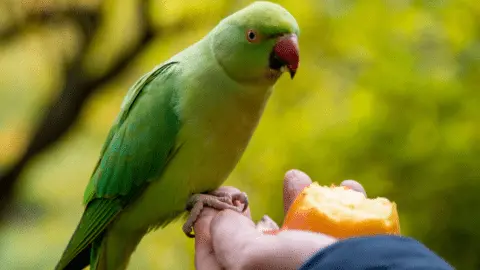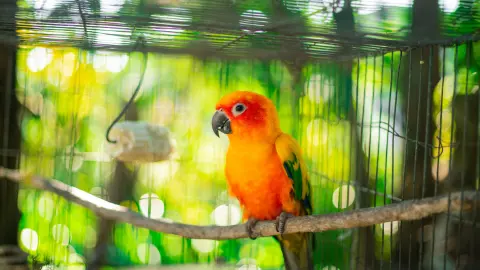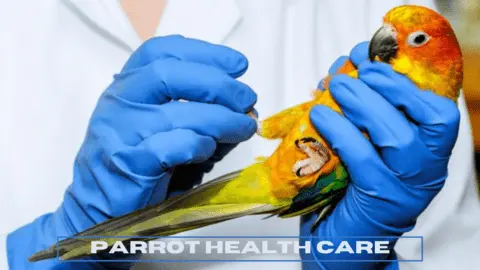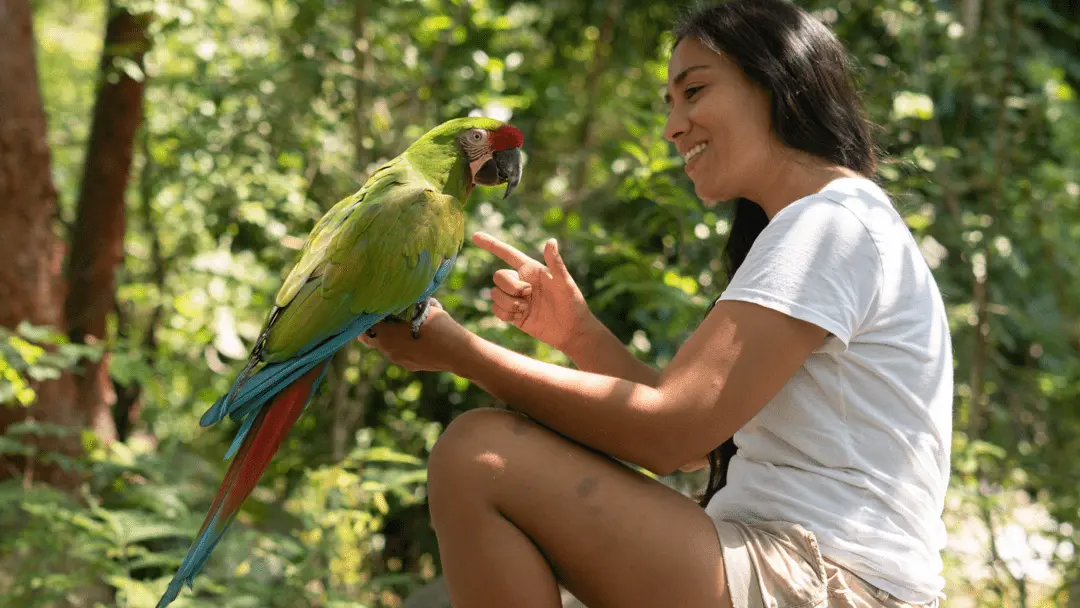Parrots are fascinating creatures known for their intelligence and colorful plumage. If you are the proud owner of a parrot, you must know how to properly care for them to ensure they live a healthy and happy life.
So, how do you care for your parrot? The most important aspect of caring for a parrot is its diet. Parrots are omnivorous and require a well-balanced diet of fresh fruits, vegetables, nuts, and seeds. It is also critical to always provide them with clean and fresh water. Proper cage setup, grooming, and regular health check-ups are also essential for a parrot’s well-being.
This comprehensive guide will cover parrot care, including diet, cage setup, exercise, grooming, and health issues. Keep reading and learn all these aspects.
Diet

A parrot’s base diet should consist of well-formulated pellets and seeds. However, additional supplements must be provided. Consider the following examples:
What To Feed Your Parrot
A balanced diet for your parrot should include fresh fruits, vegetables, nuts, and seeds. Some good options include:
- Fruits: apples, bananas, grapes, oranges, berries, kiwi, mango, papaya, pomegranate, and pineapple
- Vegetables: broccoli, carrots, sweet potato, kale, spinach, peas, beans, bell peppers, and squash
- Nuts and seeds: almonds, macadamia, hazelnuts, walnuts, sunflower seeds, pumpkin seeds, and chia seeds
- Protein sources: boiled eggs, chicken, and fish
What Not To Feed Your Parrot
There are several foods that you should avoid feeding your parrot as they can be harmful to their health. These include:
- Avocado
- Chocolate
- Caffeine
- Alcohol
- Eggplant
- Onions
- Cabbage
- Rhubarb leaves
- High-fat, high-sugar, and high-sodium foods
How Much to Feed Your Parrot?
The amount of food your parrot requires is determined by age, size, and activity level.
- Generally, give your parrot 1-2 tablespoons of fresh food per 100 grams of body weight daily. This should be divided into two or three meals throughout the day.
- Because baby parrots have faster metabolisms, you may need to increase the proportions when weaning them.
- Fruits and vegetables should not exceed 20% of the main diet.
- Treats such as nuts and seeds should only make up 10% of the diet and be offered in moderation.
- But how often should you offer fruits, vegetables, and seeds? Once or twice a week is enough for your parrot.
Also Read: How Much Does A Parrot Cost
Housing And Placement

A safe and comfortable living environment is an essential component of how to care for a parrot. Hence, the cage should be large enough for your parrot to move around and stretch its wings.
Cage Size
The parrot’s size determines the ideal cage size.
- A general rule of thumb is that it should be at least twice the width of your parrot’s wingspan and tall enough for them to climb and play.
- So the minimum cage size should be 24″ Wide x 24″ Height x 24″ Deep.
Bar Spacing
- The ideal bar spacing for smaller parrots, such as budgies or cockatiels, is between 1/2 and 5/8 inches (1.3-1.6 cm).
- For larger parrots, such as macaws or African grays, the bar spacing should be between 3/4 and 1 inch (1.9-2.5 cm).
- Choose a cage with appropriate bar spacing to ensure your parrot’s safety and comfort.
Cage Material
- The cage should be made of sturdy material, such as stainless steel or powder-coated wrought iron, to prevent your parrot from chewing through it.
- It should have a secure door and locking mechanism to prevent escape and keep out predators.
- And the bottom of the cage should be lined with a tray or newspaper to make cleaning easier.
Cage Placement
- The cage should be placed in a room where your parrot can interact with family members but away from windows, drafts, and direct sunlight.
- Parrots are sensitive to temperature changes, and exposure to direct sunlight can cause overheating and dehydration.
- Thus, keeping the cage away from the kitchen is also essential, where cooking fumes, e.g., from non-stick pans and smoke, can harm your parrot’s respiratory system. Other cage placement tips include:
- Keep other pets, like cats, away from the parrot’s vicinity.
- Ensure there are no loud noises near the cage.
- Cover the cage at night to keep away light. This promotes quality sleep for your feathered friend.
Room Temperature
- The ideal temperature for parrots is between 65°-85°F (18°-29°C), with 40%-60% humidity.
- Keep the room temperature consistent and avoid sudden changes, such as opening windows or doors.
- Use a thermometer to monitor the temperature and a humidifier or dehumidifier to adjust the humidity level if necessary.
Enrichment
Another important aspect of how to care for a parrot is providing your parrot with mental and physical stimulation so that it stays healthy and happy. Provide plenty of toys, perches, and climbing structures in the cage to keep your parrot active and engaged.
Cage Cleaning
A clean living environment is essential for your parrot’s health.
- Clean the cage daily to prevent the accumulation of waste and bacteria.
- Remove any uneaten food, droppings, soiled bedding, and debris from the cage floor and replace it with fresh paper or tray liners.
- Also, wash the food and water bowls every day.
- It is recommended to have extra bowls so that you can use them while cleaning the others.
- Also, remove all toys, perches, and other cage accessories and wash them with soap and water once a week.
- Rinse them thoroughly and allow them to dry before returning them to the cage.
- Scrub the cage bars, bottom, and sides, then rinse and dry thoroughly.
- Have an extra cage where you can put the parrot when cleaning.
- Avoid harsh cleaning chemicals, such as bleach or ammonia, as they can harm your parrot’s respiratory system. Instead, use pet-safe cleaning products or a mixture of vinegar and water.
Mental Stimulation
Here are some tips to help promote mental stimulation for your parrot:
Offer Toys
As mentioned, provide various toys for your parrot to play with.
- Toys can include puzzle toys, foraging toys, and chew toys.
- Rotate the toys regularly to prevent boredom, and add new ones to keep your parrot interested.
Teach New Tricks
Parrots are quick learners and enjoy learning new tricks. Spend some time each day teaching your parrot new tricks and commands. This can include teaching it to wave, turn around, or speak.
Encourage Foraging
Foraging is a natural behavior for parrots, and providing foraging opportunities can help promote mental stimulation. Hide food in foraging toys or scatter it on the cage floor to encourage your parrot to search for it.
Allow Free Flight Time
Parrots are active birds and require regular exercise. Allow your parrot to fly freely in a safe and secure area of your home to promote physical and mental stimulation.
Adding A Companion
If you have a single parrot, consider getting another one to keep it company. However, it is important to introduce them gradually and carefully to avoid conflicts.
When introducing a new parrot, keeping them in separate cages is best. This will allow them to get used to each other’s presence without physical contact. Once they are comfortable with each other, you can allow them to interact under supervision.
Grooming
Regular grooming can help keep your parrot’s feathers and skin healthy, prevent infections, and strengthen the bond between you and your bird. Here is how to go about it:
- Bathing: Some parrots enjoy bathing in a shallow water dish, while others prefer being misted with a spray bottle. You can also provide your parrot with a bird bath or take it into the shower.
- Feather care: Regularly trim your parrot’s nails to prevent them from becoming too long. If you notice any damaged feathers, gently remove them to prevent them from causing discomfort or infection.
- Skincare: Parrots can develop skin problems if their feathers are not properly cared for. You can provide your parrot with a bird-safe moisturizer or oil to help keep its skin healthy and supple.
- Beak care: Provide your parrot with various safe chew toys to help keep its beak healthy and strong. For example, Applewood, Manzanita, Rosewood, and Willow.
Health

Illnesses can occur in any pet, and it’s a common experience for pet owners. Dealing with sickness is not desirable, but it’s inevitable. Here are the signs of a sick bird:
- Decreased appetite or thirst
- Lethargy or weakness
- Discharge from the eyes or nostrils
- Abnormal droppings or feces
- Changes in behavior or vocalizations
The most common illnesses associated with parrots are:
- Psittacosis: This is also known as parrot fever, a bacterial infection that can be transmitted from birds to humans. Symptoms can range from mild, flu-like symptoms to severe respiratory distress.
- Aspergillosis: This is a fungal infection that affects the respiratory system of birds. It is often caused by exposure to damp or moldy environments, so keeping your parrot’s living area clean and dry is important.
- Feather picking is a behavioral disorder caused by stress, boredom, or nutritional deficiencies.
- Polyomavirus: This viral infection can cause lethargy, weight loss, and diarrhea in young parrots. This disease is highly contagious and can be fatal, so it is important to vaccinate your parrot and maintain good hygiene to prevent the spread of the virus.
- Psittacine beak and feather disease: This disease can cause beak deformities, feather loss, and skin irritations. It has no cure, but proper management and treatment can help control symptoms.
If you observe that your parrot is sick, ensure you take it to a veterinarian. Also, you may schedule regular vet visits once or twice a month to ensure the bird is healthy.
Conclusion
Caring for a parrot necessitates a significant amount of dedication and commitment, but the benefits of having a happy and healthy feathered companion are well worth the effort. You can provide your parrot with a safe, healthy, and stimulating environment by following the guidelines outlined in this article.
Proper nutrition is critical for the overall health of your parrot, and it is critical to provide a balanced diet. Adequate hydration is also essential, so always provide your parrot with fresh, clean water. Finally, the key to caring for a parrot is to provide a loving and attentive environment that meets its physical, social, and emotional needs.

Hello, this is Frank Swanson, the owner, and operator of Pet Info Hut. I created this website as a way to share my love of pets with the world. I have over 7 years of experience working with animals, and I have a passion for helping people care for their pets. I hope that you find my website useful and informative. Thanks for visiting!

